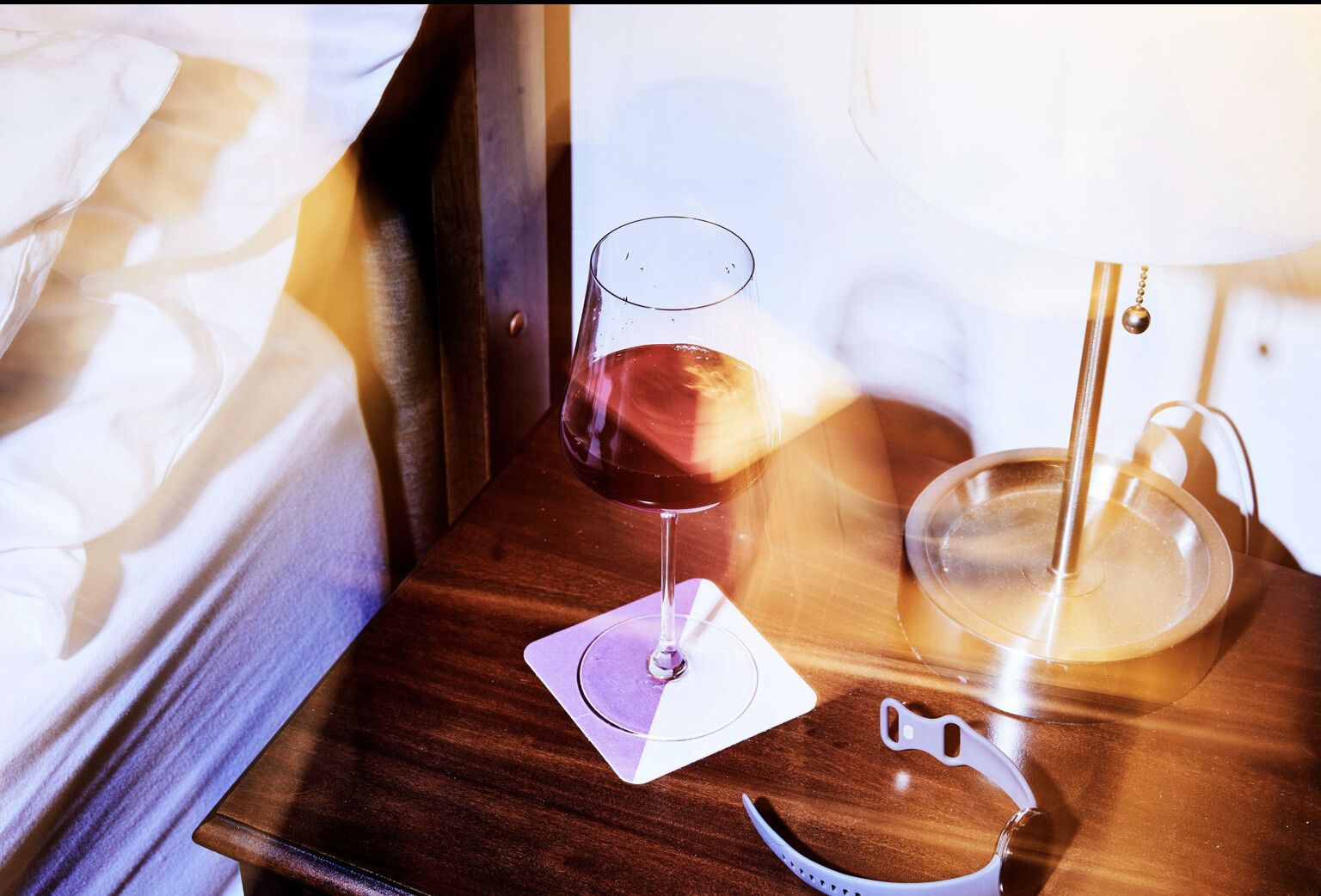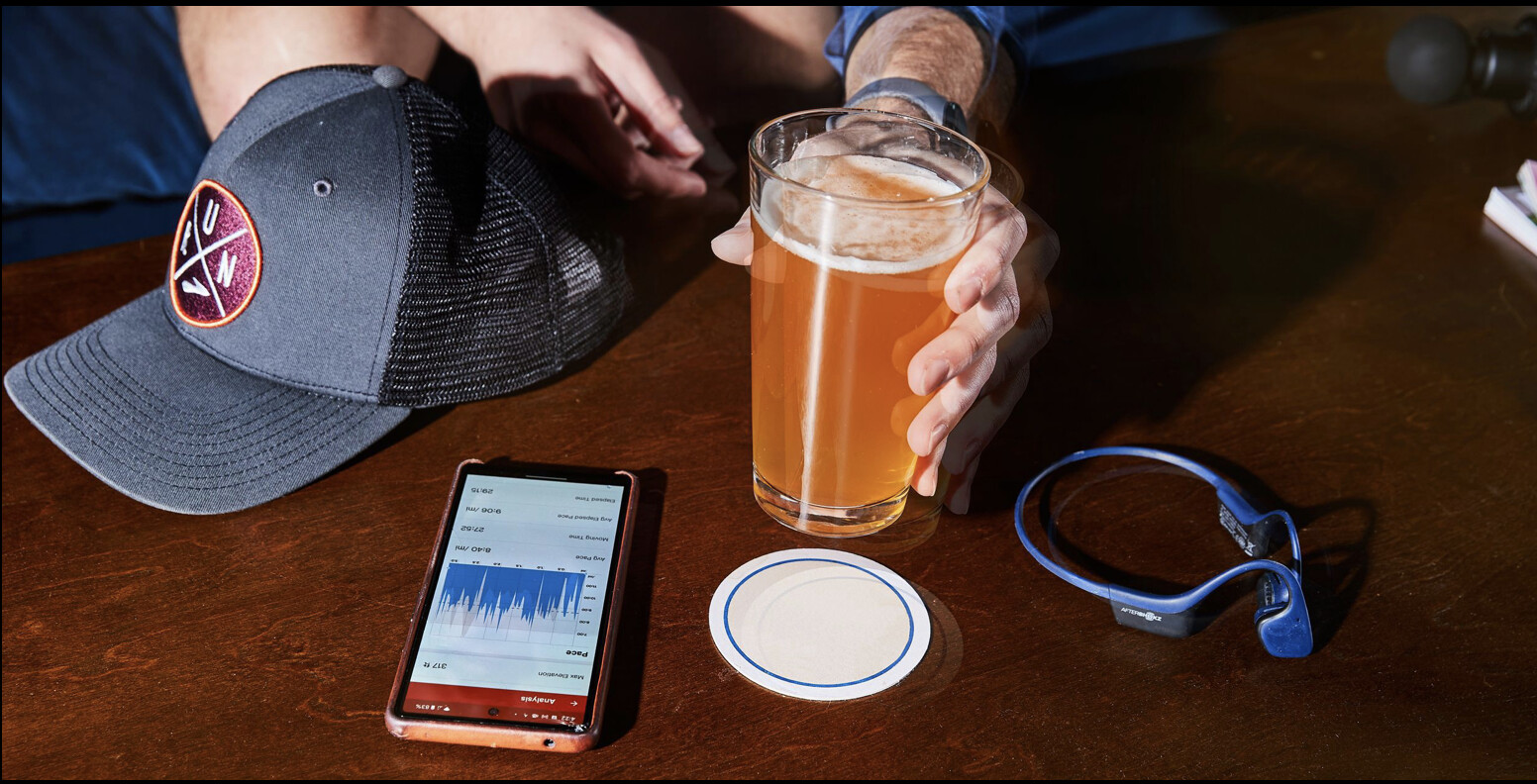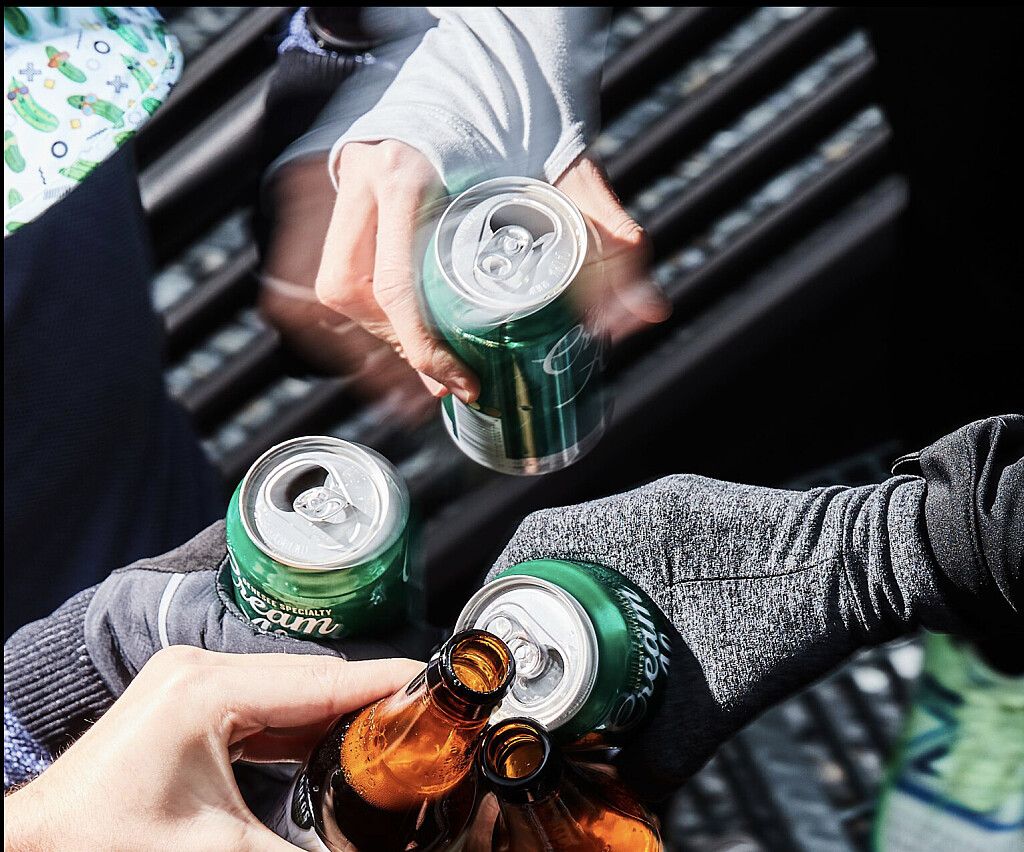Running News Daily
Running News Daily is edited by Bob Anderson. Send your news items to bob@mybestruns.com Advertising opportunities available. Train the Kenyan Way at KATA Kenya and Portugal owned and operated by Bob Anderson. Be sure to catch our movie A Long Run the movie KATA Running Camps and KATA Potato Farms - 31 now open in Kenya! https://kata.ke/
Index to Daily Posts · Sign Up For Updates · Run The World Feed
Do Runners Drink Too Much Alcohol?
A growing body of research says that no amount of alcohol is good for our fitness and health. It’s time to rethink our relationship with booze.
Pro ultrarunner Coree Woltering doesn’t do anything halfway. “If I’m going to do it, I want to do like 120 percent, no matter what it is,” he says. When he brings that attitude to his running and racing, the results speak for themselves—like setting a new fastest known time on the 1,000-plus-mile Ice Age Trail across Wisconsin in 2020.

However, Woltering also brought that attitude to the bar. “It wasn’t just a ‘let’s have two beers and be done’ thing,” says the 32-year-old from Dalton, Georgia. Two beers at his house would lead to four more at the bar. “Six a night would be normal.” The results were noteworthy—but in all the wrong ways. His training became inconsistent. After long nights out, he’d sometimes skip sessions. When he did get out to run, he found his focus and mental fortitude lacking. Woltering doesn’t take over-the-counter pain management medications like Tylenol or ibuprofen. Instead, he’d slam a beer or two late in a race, hoping to hush the screaming of his feet and legs.
This approach is not unusual, says David Wyrick, PhD, a public health education professor and the director of the Institute to Promote Athlete Health & Wellness at the University of North Carolina, Greensboro. Wyrick studies alcohol use among student-athletes. Pain control is one of three primary reasons athletes report using alcohol (along with stress management and as a way to celebrate). Though, when it comes to pain, “there’s no evidence that alcohol has medicinal benefits,” says Wyrick.
Almost all the benefits Americans attribute to alcohol—that it is good for the heart, helps you sleep, eases pain—are false, says George F. Koob, PhD, director of the National Institute on Alcohol Abuse and Alcoholism. “The truth is, there’s no safe amount of alcohol, not even one drink a day,” he says.
And yet: Running culture—which is otherwise populated by protein-shake-drinking, heart-rate-tracking, health-obsessed fitness nuts—is enmeshed with drinking. From brewery-based runs to the infamous beer mile to groups with the motto “a drinking club with a running problem,” alcohol is as much a part of the fabric of our sport as energy gels. But the fact is, alcohol destroys lives and families. Running culture that glibly celebrates it is feeding that destruction.
Pulling them apart doesn’t mean eliminating alcohol. Koob has spent the last eight years working on issues around alcohol abuse, yet he describes his own approach to alcohol as “one eye open.” A glass of beer or wine every now and then? That’s fine for most runners. But blithely telling yourself beer is a recovery drink because it has carbs and your Tuesday night run ends at a bar? Not so much.
It’s time to take a good look at what we know—and don’t know—about alcohol’s relationship to our health, running performance, and mental well-being.
Booze and Sleep Don’t Mix

Three years ago, journalist Lisa Slade, a 38-year-old recreational marathoner, purchased a Whoop wearable device. Each morning, Whoop prompted her to input data about what she did before bed. Questions included: Did you eat a big meal? Are you under a lot of stress? Did you consume alcohol last night?
At the end of the first month, Slade got a summary of her data. “Pretty much the only thing I noticed that negatively impacted me to an alarming amount was alcohol,” she says. Slade had considered herself a light drinker—maybe a beer while making dinner, or two cocktails if she was out with friends. Even that low dose, though, was affecting her recovery times and sleep quality by as much as 20 percent. “I could tell that I was having a harder time recovering from it,” she says. After “just one or two drinks, I’d wake up and wouldn’t feel so good, like I hadn’t slept super well.”
Emily Capidolupo, senior vice president of data science and research at Whoop, says Slade’s revelation is common among new Whoop users. She adds that many cut back on drinking after a few months of using the wearable, which uses biometric data like heart rate, heart-rate variability, respiration rate, and sleep quality to score a user’s overall recovery. Alcohol “is one of those things we know is bad for us, but we don’t realize quite how bad,” she says. When Whoop presents the data in a tidy end-of-month report, it’s clear for many users that alcohol is a poison. “It’s a fun poison,” says Capidolupo. “But it’s poison.”
When you head out for beers after an evening run, you put an extra task on your body’s to-do list. In addition to recovering, it now must divert energy to breaking down the alcohol entering your bloodstream, inhibiting crucial functions like repairing exercise-induced muscle damage. Alcohol also impacts your immune system, blocking inflammatory responses vital to this process. For chronic drinkers, the negative effect on immunity can lead to more illness and fewer training days.
Compounding the issue, though, is that the most popular time to imbibe is in the hours before bed. Alcohol wrecks sleep quality, says Christopher Winter, MD, a Charlottesville, Virginia–based sleep specialist and host of the Sleep Unplugged podcast. If this seems counterintuitive, and a single beer makes you drowsy, you’re not alone. Alcohol is the most popular sleep aid in the country, he says, but that’s because most people don’t understand the difference between being sedated and being asleep.
Alcohol suppresses your central nervous system. That is not high-quality rest. Since alcohol relaxes a lot of the muscles involved with breathing, you may breathe less deeply as you sleep, lowering your oxygen saturation levels, says Winter. When you’re not getting enough oxygen, your body’s natural response is to wake you up. Alcohol also suppresses deep sleep, which is when your body makes growth hormone.
“If you’re grinding out the miles and trying to recover before a race or your next training session, alcohol impairs your ability to do that,” he says. It may also interfere with the secretion of melatonin, a hormone associated with sleep, which can mess with your shut-eye schedule causing daytime drowsiness and nighttime restlessness—so you reach for another beer. If you do plan to drink, drink less and do it very early, says Winter. “There really is no way to sidestep its negative properties.”
Not being able to fall asleep can cause extreme anxiety, especially as you count the minutes wide awake until the alarm says it’s time to get up. Many people turn to alcohol to dull anxiety, though it’s neither good nor effective, says Winter. It may mask the issue for a night, but it won’t give you the rest you need. If you’re struggling to get to sleep at night, first clean up your sleep hygiene by logging off devices and stress-inducing news sources at least an hour before bed. Consider meditation or quiet journaling, which can help you unwind, says Winter. And if you’re still worried about your sleep quality, take the issue to a sleep specialist.
The Pandemic Didn’t Help
J.R. Jamison, a 43-year-old Indiana-based author and NPR host, took up running 10 years ago and eventually lost 80 pounds. He was healthy and fit and loved how running got him out into the world. But when the pandemic hit, he found it difficult to differentiate between weekends and weekdays.
Jamison admits his weekend drinking habits had always been on the heavy side. But when Tuesday night started to feel just like a Friday night and no one was going anywhere, weekend drinking became everyday drinking. Next thing he knew, the running habit that had changed his life had fallen by the wayside. “There’s no doubt that substance use disorders have skyrocketed since the pandemic,” says Dave Rabin, MD, PhD, a San Francisco–based psychiatrist. A CDC report from August of 2020 found that 13 percent of Americans started or increased their use of substances like alcohol during the first six months of 2020.
Rabin says that, at its core, substance use stems from a human desire to avoid discomfort like stress, anxiety, or lack of control. And if we haven’t learned healthy, long-term strategies for managing discomfort, we look for something to alleviate that discomfort. Alcohol often produces the desired numbing effect.
As Jamison found himself drinking more, he had less energy and motivation. He’d wake up with brain fog and struggle through a day of work. With no impetus to run, and little accomplished professionally, he’d reach for a drink each night.
What’s so insidious about alcohol and other sedatives, says Rabin, is that these drugs numb our frontal-cortex activity, decreasing our insight and judgment. As a result, we unwittingly train ourselves to embrace a casual attitude toward self-reflection—and wind up oblivious to our problematic behavior, he says.
Running, however, does the opposite. It results in a neurochemical response in the brain, with endogenous pleasure molecules, endogenous opioid molecules, and endogenous cannabinoid molecules, plus dopamine and serotonin, all releasing on cue like one glorious feel-good chorus. This is why addiction specialists often recommend it as a coping mechanism for those struggling with alcohol use disorder, says Rabin.
But running won’t help if you can’t summon the motivation to do it. It took Jamison more than a year to rediscover his enthusiasm. As 2021 came to a close, he committed to Dry January. “I didn’t have a drop to drink throughout January, and I started to notice that I wasn’t waking up anymore with headaches,” he says. He started running again. “I liked the way I felt. I was happier. I just decided not to drink again, and I haven’t.”
The Myth of Healthy Drinking
Not long after Lisa Slade saw the effect of alcohol on her Whoop data, she clicked around the Internet looking for more info on why the impact was so dramatic. “We’ve been told our whole lives that a beer or a glass of wine is heart-healthy,” says Slade, who has since cut back her drinking. “But I was reading studies about the effects of alcohol and it turns out that maybe it’s not good for you at all.”
Alcohol is a known carcinogen, a substance that can cause cancer, says Tim Rebbeck, MD, a professor of cancer prevention at Harvard University. When you drink, your body relies on two enzymes to break alcohol molecules into pieces small enough for removal from the body. That breakdown process creates a byproduct called acetaldehyde. Laboratory, animal, and human studies have all shown that acetaldehyde causes DNA damage to cells, and this damage can lead to cancerous tumors. “We are sure that alcohol is a causative factor in some cancers, and it’s supported by lots of different lines of evidence,” says Rebbeck.
Getting the word out that alcohol—like tobacco—is a carcinogen has been difficult for several reasons. For one thing, alcohol is socially acceptable and even socially encouraged. Furthermore, the relationship between alcohol and cancer is more complicated than smoking’s direct link to lung cancer. Head, neck, liver, and breast cancer all have strong links to alcohol, says Rebbeck. But, of course, some people who never drank a drop will still get breast cancer and vice versa. “It’s a complex story, and people have a hard time digesting complex stories,” he says. And how much of a role alcohol played in any one person’s cancer development is an impossible equation to tease out.
As for a glass of wine being heart-healthy, recent research has debunked that advice, says Koob. The early studies concluding that it helps your heart were based on the resveratrol in red wine, but the amount you’d have to drink to get the benefits of the compound would tear your liver up, he says. A 2019 study published in the Journal of The American Heart Association confirms this, finding that heavy drinking is a risk factor for cardiovascular disease.
Even studies that find some benefit to drinking may not hold up under scrutiny. Over the years, a handful of meta-analyses of all-cause mortality among drinkers versus nondrinkers found a “J-shaped curve” between the two. Basically, mortality was slightly higher for nondrinkers, but dipped for moderate drinkers, and then rose sharply for heavy drinkers, forming a J. This would appear to make the “glass of wine for heart health” statement true. But in 2015, researchers took a closer look at these studies. When they teased out exactly why many abstainers did so, they found a confounding variable: These people were eschewing alcohol because of existing health concerns. In other words, they were less healthy than the moderate-drinking group to begin with. When researchers adjusted the data to account for abstainers with outstanding health concerns, the initial hump on the J flattened out.
Studying alcohol use and health effects is difficult, in part because people often don’t remember how much they consumed or because they aren’t being honest about it, says Rebbeck. That makes giving recommendations on how much and how often to drink difficult, too.
Interestingly, not a single expert interviewed for this story told us to stop drinking. Several mentioned that they occasionally enjoy wine and beer. “‘Don’t ever do anything that might harm you’ is not useful messaging,” says Rebbeck. Life is full of things that can harm us. Overly charred toast. Processed meats. The flame retardant on our couches. Uneven sidewalks waiting for unsuspecting runners.
A better approach is to consider your personal risk factors, your tolerance for risk, and the joy that alcohol—in moderation—brings you. If you have a family history of breast cancer, or head and neck cancers, you may decide the risk isn’t worth it. If you don’t, drinking in moderation may be a risk you’re willing to take. However, “limiting your exposure to alcohol is the bottom-line answer,” Rebbeck says. “You are consuming a carcinogen. How much of that do you really want?”
The Longest Race: Sobriety
For Coree Woltering, that amount was zero. On November 1, 2021, Woltering got sober. In past years, he’d taken time away from drinking and seen an improvement in his training. But then he’d go back to drinking—and plunge off the deep end. There wasn’t a happy medium where he just had one beer every other night. “It wasn’t just like I drank to get drunk,” he says. “I really enjoyed the taste of certain wines, certain beers. But that’s part of the problem, I enjoyed it to 150 percent.”
A week of sobriety passed. Then another. He jumped in to crew a friend through an ultra and got offered a shot of Fireball at an aid station. When he turned it down, everyone was surprised. “They’re like, ‘Oh, are you not feeling well?’ I’m like, ‘No, I feel great. I’m just not drinking.’ And everyone’s like, ‘Oh, are you sick?’ ‘No, I’m not sick. I’m just literally not drinking.’” That drinking culture and running culture knot is tight.
In the first month, Woltering focused on consistency. He set a goal to run every day in December and hit 30 of the 31 days. Over time, the awkwardness with friends abated, and Woltering found a community of similarly sober athletes. But his performance wasn’t doing the about-face he’d hoped for.
The second month was the rough one. “It was like, ‘Oh, now I feel every little pain in my body,’” he remembers. And then there was the FOMO. “It’s like, for the rest of my life, am I missing out on all these beers and wine that I haven’t tasted yet?”
It would take Woltering six months to get back to a place where he felt good. Yet he wasn’t seeing the times he’d hit in previous training peaks. That was frustrating. Giving up alcohol was supposed to be this golden ticket to better health.
Finally, eight months into sobriety, things started to click. His times began to improve. Those better numbers bolstered his commitment to the sober path. And then, in October of 2022, three weeks before hitting a year of sobriety, Woltering won the Blue Ridge Ultra 50K. It was his first ultra victory since 2019. He celebrated with cake and ice cream.
by Runner’s World
Login to leave a comment




